Historical Rock Climbing
Images
|
Page
8.1
Claude E. Benson - Words of Wisdom British Mountaineering (1909) |
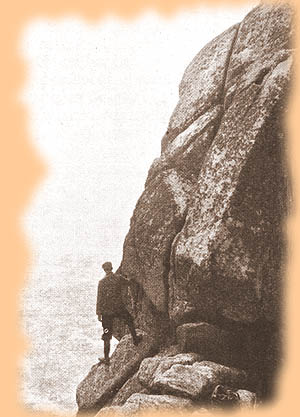 Granite of Cornwall |
On Belaying: "There is one bad habit that some Seconds have of belaying the rope after the leader has begun climbing. This is all wrong! . . . Some time ago I was reading the account of an accident . . . The leader fell some 30 feet and carried away the Second, with the result that both were knocked senseless for an hour or two and had to go to bed for a day or so." On Rope Length: " . . . a sentence from a letter from one of our greatest mountaineers . . .: 'In ascending the leading man should never go out with a longer rope than is necessary . . . I question whether 30 feet should be exceeded.' Sixty feet is a useful length for two. I am strongly adverse to a short rope." |
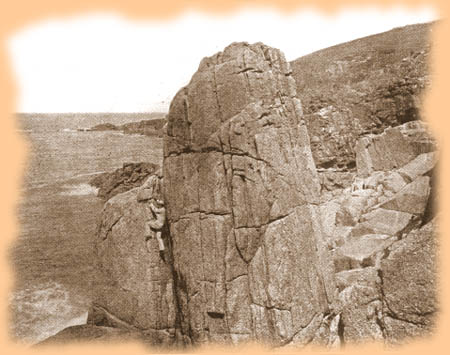 "A tough bit of rock on the Cornish cliffs" Photo A. W. Andrews |
| On Training for Rock Climbing:
"If
a gymnasium is reasonably accessible, join it. . . . One I joined was
forever turning you out for a Ladies'
Fencing Class or something of the sort, or fixing up times for
Gentlemen's
Classes at an hour which made dinner and digestion incompatible . . .
It
is well to remember that rock is not made of wood, and that one does
not
find horizontal bars adorning the interior of a gully. I am blessed
with
a basement staircase of stone, and at various periods of the day I am
to
be found hanging by my fingertips to the outside thereof. I recommend
all
who can imitate me. Let not false shame prevent them. Let them be bold,
and brave the suppressed laughter of the tweenie maid." "The late Mr O. G. Jones recommended practice on a strong mantlepiece as an aide to the ascent of the Napes Needle. It is as well to be sure the mantlepiece is strong enough, but how to apply the test is difficult to suggest. So far as I can gather, the mantlepiece never demonstrates its insecurity till you are nearly up, and then it throws you on the back of your head and makes a hole in your pocket." On Bouldering vs. Climbing: "Excellence as a rock-gymnast does not necessarily constitute excellence as a rock climber. Feats which are quite playing the game on a boulder would be wholly unjustifiable on the precipices of Cumbria, Snowdonia, and Scotland . . ." "As the difficult courses fell one by one, fresh problems were sought out and mastered, until I think I am justified in saying the extreme limit of human skill and strength has been reached. I know for instance of one little problem on which the main difficulties are concentrated in about two feet. I have seen a climber of quite exceptional skill and strength take quite a minute over those two feet . . . and I am of opinion that if that two feet were doubled in length not a man in Merrie England could make it 'go' ". On the Mistakes of Novices: "He visits the crags in the company of some climbing friends of experience who have begun at the foot of the ladder and worked up. He sees them indulging in impossible feats on impossible boulders and desires to go and do likewise. He scorns the easy courses . . . he goes out for something brilliant; he comes, he sees, he conquers. A young fellow of eighteen, fresh from school, especially if he be a rock-gymnast, with his joints unset, and without that handcap of twenty or thirty pounds extra of avoirdupois that another dozen years will put in 'the howdah on his back', will quite often be able to haul and wriggle himself up a bit of rock that will test and overtest many a mature and experienced cragsman. Consequently he will not unnaturally be disposed to think himself a better man, which is a mistake. This is where the trouble arises from the fallacy 'the shorter the climb, the stiffer must be the work' ". |
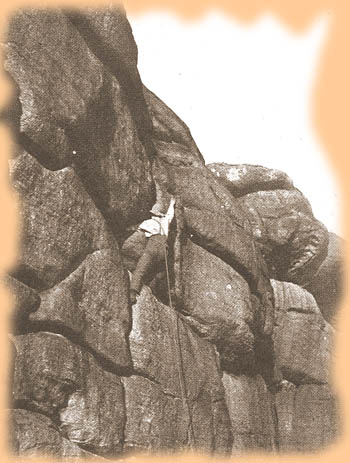 |
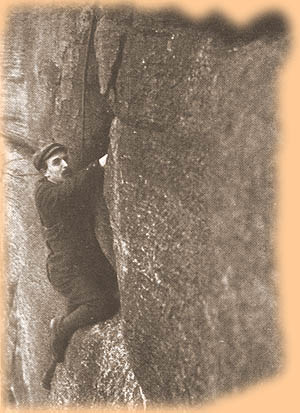 Early Gritstone Climbing |
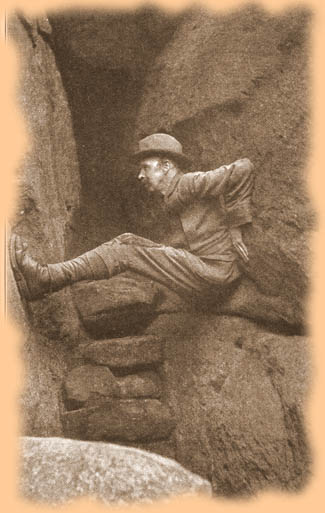 Chimney Work |
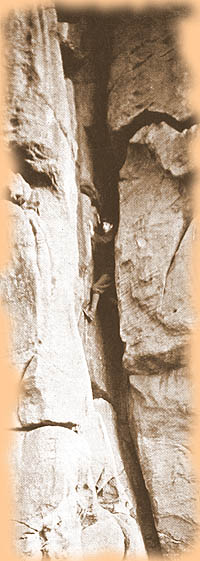 |